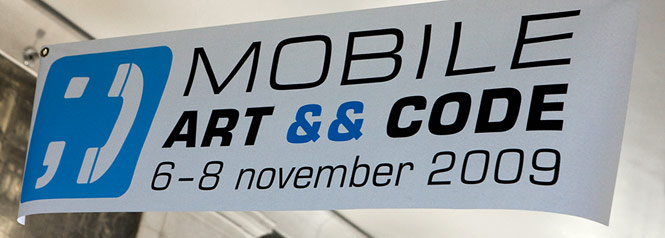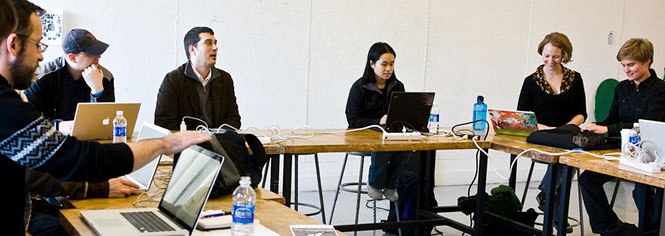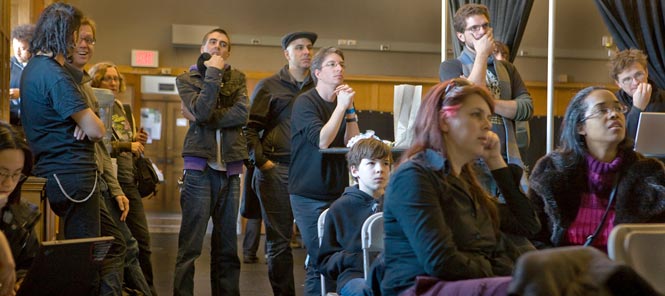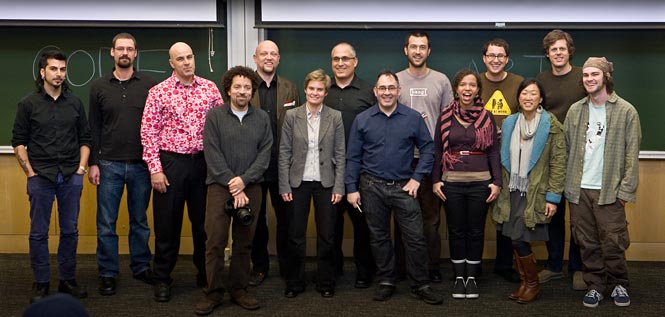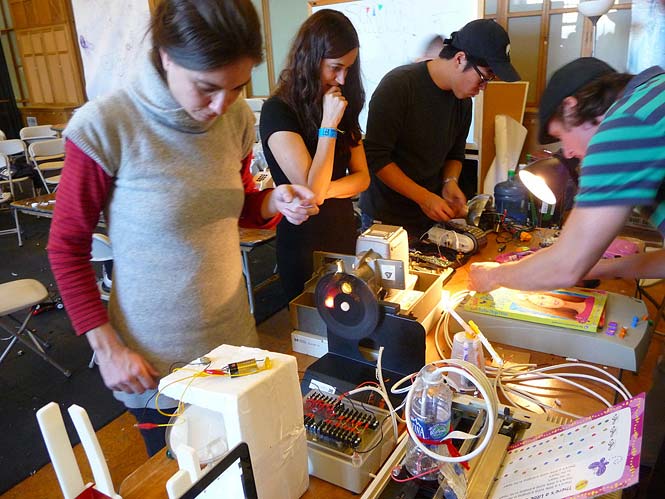Printed from www.flong.com
Contents © 2020 Golan Levin and Collaborators
Golan Levin and Collaborators
Projects
Sort by : Author | Date | Name | Type
- Installations
- Ghost Pole Propagator II
- Augmented Hand Series
- Eyeshine
- Re:FACE, Anchorage Version
- Merce's Isosurface
- Double-Taker (Snout)
- Opto-Isolator
- Eyecode
- Interstitial Fragment Processor
- Reface [Portrait Sequencer]
- Ghost Pole Propagator
- Footfalls
- Scrapple (Installation)
- The Manual Input Workstation
- Interactive Bar Tables
- Messa di Voce (Installation)
- Hidden Worlds of Noise and Voice
- Re:MARK
- Introspection Machine
- Audiovisual Environment Suite
- Dakadaka
- Rouen Revisited
- Performances
- Ursonography
- Scrapple (Performance)
- The Manual Input Sessions
- Messa di Voce (Performance)
- Dialtones (A Telesymphony)
- Scribble
- Net.Artworks
- Terrapattern
- Moon Drawings
- Free Universal Construction Kit
- QR Codes for Digital Nomads
- The Dumpster
- Axis
- JJ (Empathic Network Visualization)
- The Secret Lives of Numbers
- Alphabet Synthesis Machine
- Obzok
- Sketches
- Stria
- Dendron
- Slamps
- Banded Clock
- Floccus
- Stripe
- Meshy
- Directrix
- Yellowtail
- Streamer
- Blebs
- Self-Adherence (for Written Images)
- Poster design for Maeda lecture
- The Role of Relative Velocity
- Segmentation and Symptom
- Floccular Portraits
- Curatorial
- Mobile Art && Code
- ART AND CODE
- Code, Form, Space
- IEEE InfoVis 2008 Art Exhibition
- Solo exhibition at bitforms gallery
- IEEE InfoVis 2007 Art Exhibition
- Signal Operators
- Commercial / Industrial
- Motion Traces [A1 Corridor]
- Civic Exchange Prototype
- Amore Pacific Display
- Interactive Logographs
- Interval Projects
- Media Streams Icons
- Miscellaneous
- NeoLucida
- Rectified Flowers
- GML Experiments
- New Year Cards
- Admitulator
- Glharf (or Glarf)
- Finger Spies
Mobile Art && Code
2009 | Golan Levin with the STUDIO for Creative Inquiry at Carnegie Mellon University
The ART && CODE events are a series of educational conferences dedicated to the democratization of computer programming for artists, young people, and the rest of us. The first ART && CODE event was held in March 2009, and considered arts-programming environments for the desktop and laptop realms. Mobile Art && Code was the second event in this series: a symposium on the artistic and tactical potential of mobile, networked and locative media. Mobile Art && Code took place November 6-8, 2009 at Carnegie Mellon University in Pittsburgh. The three-day event featured intimate, practical, arts-oriented programming workshops for popular mobile platforms (such as the iPhone, Android, Nokia Smartphones, Arduino, SMS (Short Messaging Service), and Asterisk PBX telephony systems) along with an all-day series of free lecture presentations that contextualized the use of these technologies in a variety of contemporary critical, artistic and design practices. The conference also featured a Scrapyard Challenge and an evening of new-media performances and urban interventions based on mobile electronics.
Resources and documents
- Mobile Art && Code official web site
- Documentation of the previous Art && Code event
- The Mobile Art && Code conference program:
 [3.1 MB pdf]
[3.1 MB pdf] - Abridged executive report for Mobile Art && Code:
 [4.2 MB pdf]
[4.2 MB pdf]
Just as true literacy in English means being able to write as well as read, true literacy in software demands not only knowing how to use commercial software tools, but how to create new software for oneself and for others. This premise has become increasingly urgent as everyday computing moves to mobile devices, which have been widely adopted by consumers and young people, but are notoriously challenging to program. In a world in which 90% of teenagers carry powerful computers in their pockets, we seek to challenge the implicit assumption (and form of learned helplessness) that software is necessarily something made by someone else.
Recently, a number of projects dedicated to democratizing the education of computational thinking have coalesced. Emerging primarily from the arts sector, new programming tools (and accompanying pedagogic techniques) have been developed by artists, and for artists, to help regular folks and other non-computer-scientists learn to developing mobile and locative experiences. The Mobile Art && Code conference was intended for just such an audience. Friday and Sunday of the conference featured 23 hands-on workshops in arts-oriented mobile phone programming – including device programming workshops for 4 major mobile operating systems – as well as practical courses in interface design for mobile devices, interactive telephony and voice-response systems, computational text messaging, and microcontroller programming with the Arduino (a tiny computer which is popular for making interactive objects).
Mobile Art && Code brought together 164 attendees, whose ages ranged from 12 to 68 (with an average of 29). Of the attendees, 52% were from Carnegie Mellon University, 61% from Pittsburgh, and 64% from the state of Pennsylvania. The remaining 36% came from 15 states (spanning from California to Massachusetts) and from six countries (USA, Canada, England, Finland, France, Portugal). Although the plurality of attendees were university students studying Human-Computer Interaction (HCI), computer science and design, attendee occupations also included artists, magicians, high school teachers, and university professors. The 164 attendees enrolled in 258 three-hour workshop sessions, for an average of 1.6 workshops per person, 11 persons per workshop, and a weekend total of 774 person-hours of learning. Thirty-one percent of the attendees were female.
Mobile Art && Code also had a lecture marathon day featuring a dozen presentations by leading international artists, designers, historians, hackers, entrepreneurs and researchers working in mobile and locative media. The presenters included Memo Akten (MSA Visuals), Stuart O. Anderson (Carnegie Mellon), Frauke Behrendt (University of Sussex), Julian Bleecker (Near Future Laboratory), Jonah Brucker-Cohen (New York University), Marc Davis (Invention Arts), David Evans (Deeplocal.com), Lesley Flanigan, Zach Gage, Lalya Gaye (RISD), Moxie Marlinspike (ThoughtCrime.org), Katherine Moriwaki (Parsons School of Design), David Nolen (NYU ITP), Eric Paulos (Carnegie Mellon), Jürgen Scheible (UIAH, Helsinki), Hans-Christoph Steiner (NYU ITP), Jacob Tonski (Miami U. of Ohio), and Shawn Van Every (NYU ITP). These lectures are shown below:| Marc Davis, Inventing the Future of Mobile, Art, and Code (Keynote Presentation) See more | |
| Frauke Behrendt, Mobile Phone Art in the Last Decade See more | |
| Eric Paulos, DIY Culture and 'Citizen Science' See more | |
| Julian Bleecker, Design Fiction: The Mobile Phone See more | |
| Layla Gaye, Embodiment, Urban Space, and Migration See more | |
| Jonah Brucker-Cohen, Deconstructing Networks See more | |
| Katherine Moriwaki, Artist Talk See more | |
| Zach Gage, OpenFrameworks for the iPhone See more | |
| Mehmet (Memo) Akten, Artist Talk See more | |
| Jürgen Scheible, MobiSpray See more |
Acknowledgments
Mobile Art && Code was made possible by a generous grant from Microsoft Research, with oversight from the Center for Computational Thinking at Carnegie Mellon University, whose mission is to "advocate for the widespread use of computational thinking to improve people’s lives", and with administrative and logistical support from the STUDIO for Creative Inquiry at CMU, whose mission is to support "atypical, interdisciplinary, and inter-institutional research projects at the intersection of arts, sciences and technologies." Mobile Art && Code was directed by Golan Levin. Complete acknowledgments can be found on the official conference credits page.
Keywords
Mobile arts, mobile music, locative media, mobile arts programming, mobile software, education, pedagogy, computational arts, programming toolkits, environments, development platforms, computer science, conference, symposium, workshops, Carnegie Mellon University, Center for Computational Thinking, STUDIO for Creative Inquiry, mobile art and code, #artandcode, Mobile Art && Code, Art&&Code, Art&Code.
